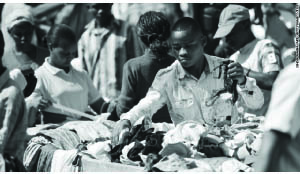By JOWIT SALUSEKI –
DESPITE a ban on second hand undergarments in Zambia, traders are still making brisk business with the clothing.
The market for used materials has been increasing year after year in the country.
There has been a debate within Zambia and other nations in Africa on the impact of second hand clothes on the society and the environment particularly the innerwear to people’s health.
Medical studies have also raised the alarm that used wears pose to the health of its users.
According to researcher’s bacteria, fungi, parasitic and viral infections can be contracted through the wearing of second-hand clothes.
Infections such as viral and skin candidiasis, scabies, chicken pox, syphilis, gonorrhea, among others, can be linked to wearing inner wear previously used by infected persons.
The risks of infection are heightened where users fail to wash, properly disinfect, and iron the clothes.
Other experts say some bacteria are very resistant and can survivor harsh conditions for long on clothes such that regular wash may not get rid of some of the bacteria, especially those that come with discharge from the previous user.
But despite health experts warning people to avoid wearing used inner clothes like bras and pants, because the used wears can cause diseases such as skin cancer and irritable diseases, a cross section of the society still prefer buying and wearing used wears.
Some women who were found buying second breast holders along Lusaka’s Cha Cha Cha and Freedom Way roads gave reasons as to why they prefer second hand undergarments.
Mapalo Bwalya said second wears are affordable, cheap, and unique.
“The reason I personally buy second hand underwear is because they are affordable, unique and cheap… they are different because when you buy one then you are the only one who will have that particular type unlike these other new clothes coming from other foreign countries” she said.
Petronellah Sikondi echoed similar sentiments but added that most people wash the second hand under garments before they wear them.
“If these second hand wears are capable of causing diseases, then most people in Zambia would have contracted the same diseases. Most people like second hand clothes because they are durable,” said Ms Sikondi.
Hendrix Mwanza a Taxi driver, who was spotted buying second hand pants says used undergarments are genuine and affordable, a reason
why generations of people have been buying and wearing them from time immemorial.
“I prefer used underwear and vests because they last longer and are very cheap , the new ones wear out so easily the moment you wash them,” said Mr Mwanza.
Rose Mawele said the choice on whether to buy second wears or not depends on the status of an individual.
“It is not right to ban these garments because we all belong to different social classes … used underwear is all that the poor people can afford. I know that these wears are not washed after being worn by the previous customer so I make sure that I wash them before using them,” said Ms Mawele.
The Zambia Bureau of Standards (ZABS) had imposed a ban on the importation and selling of second hand undergarments for health reasons.
Some countries that has banned the importation and selling of used wears include Ghana, Tanzania, Rwanda, and Zimbabwe.
However a check at Lusaka’s Soweto flea Market and within the central business district reveals that most traders have continued trading in
second hand underwear.
The demand from customers also seems to be high as evidenced from the number of clients flocking to buy the clothing on the streets of
Chachacha and Freedom way in Lusaka.
Recently the Zambia Bureau of Standards warned that it was going to pounce on traders selling second hand underpants because salaula undergarments were reported to be unhealthy.
Zambia Bureau of Standards public relations officer Lee Haamunji says second –hand underwear was unhealthy and that Zambians should stop
buying them.
He said ZABS has been sensitising traders against selling second hand underwear as they are not safe for people because they pose a health
risks to their lives.
“In the Zambian tradition when a person dies that person is buried together with their underwear, relatives will not be allowed to get
their underwear because of health reasons,” he said.
Mr Haamunji said the ban on the selling of second hand pants was law and that traders should abide by it because doing so would result in ZABS confiscating the attire.
He said it was it was sad that traders had defied that directive by the Zambia Bureau of Standards to stop the supply and sale of the second hand underwear, stressing that people should be buying genuine and brand new clothes and use products that are good for their health.
However, the clothes wear themselves say that they wear the second hand clothes because they are cheap, durable and of high quality as
compared to some brand new ones.
Estina Bwalya who has been trading in an assortment of second hand clothes for the past 10 years says she is making a fortune from the sale of second-hand wears as most of her clients are comfortable with the inner clothes.
“Most of my customers come to buy second hand clothes including underwear because they are genuine as compared to some fake imitations of brands that are being imported in the country from some Asian countries,” Ms Mwale said.
Although experts say second wears cause fungal infections, Ms Mawele says she has not contracted any skin disease because of wearing second hand pants.







